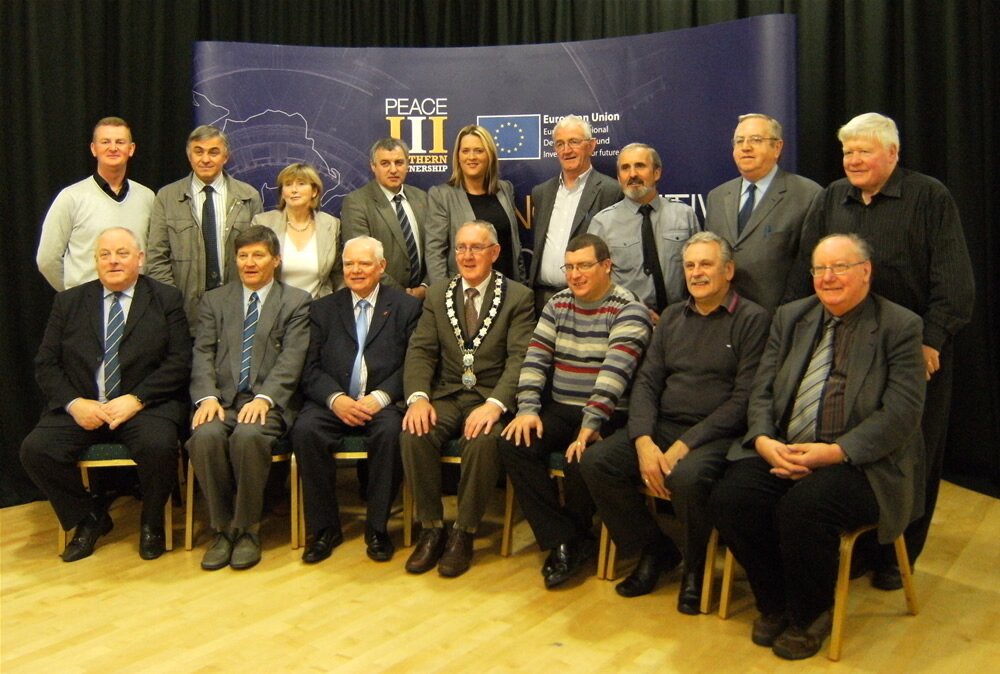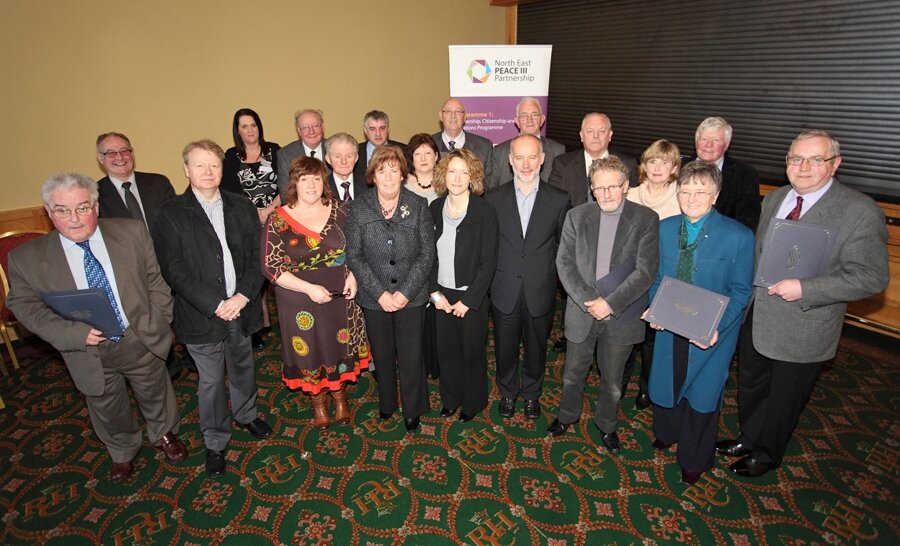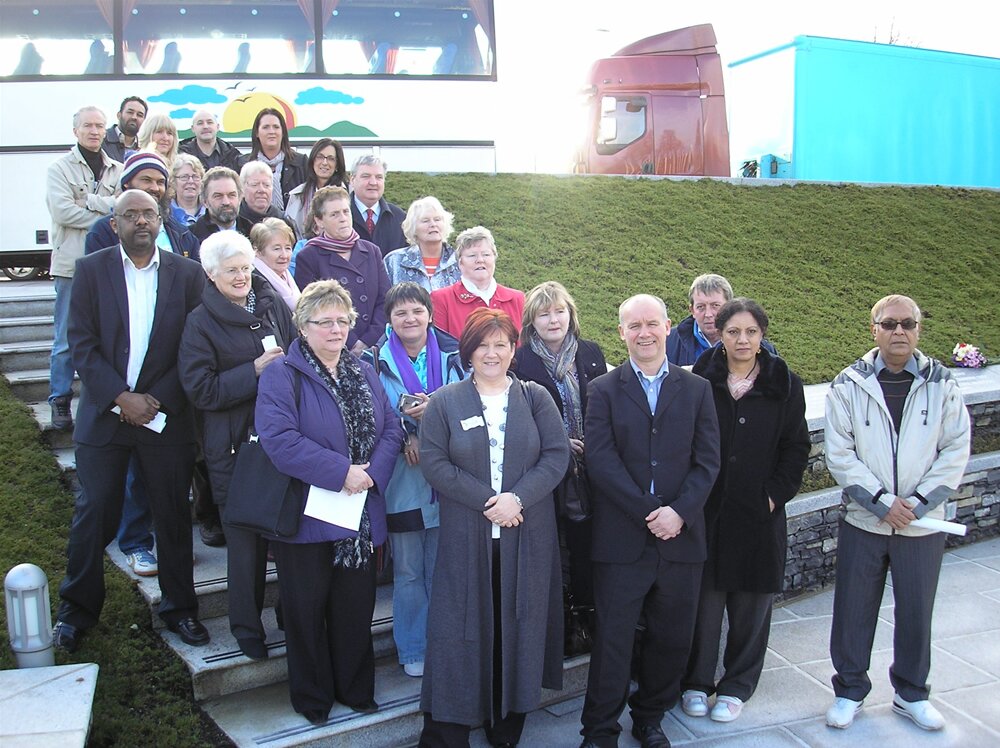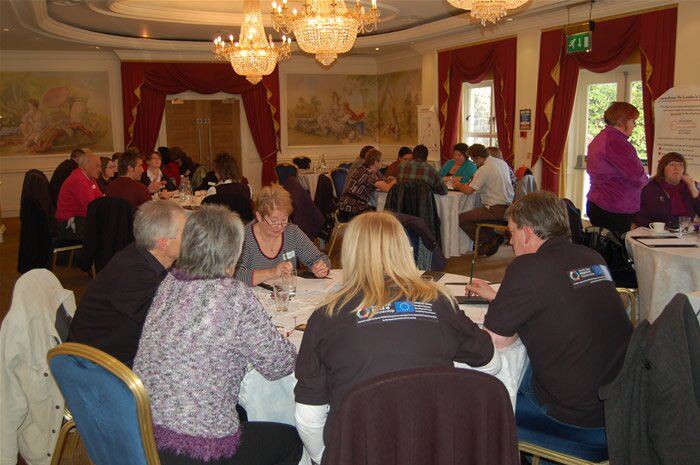| Leadership in a Shared Society |

|

|

|
The Leadership in a Shared Society – Community Leaders Programme is an initiative of the North East PEACE Partnership (encompassing the Council areas of Coleraine, Limavady,Moyle, Ballymoney, Ballymena and Larne) and is funded under the Peace III Programme. The aim of the programme is to deliver an accredited programme of learning to existing and emerging community leaders in this area to improve their skills in building trust, tolerance and understanding of difference and to build collaborative approaches to the development andmaintenance of good relations.
The programme will consist of the following elements:
that they and their organisations can have a record of the learning provided to aid their future work.
Who can apply?
The programme is not just for those currently recognised as leaders in their communities, but also those who are potential leaders of the future. As a high demand is anticipated there is an application process and applicants must meet the following criteria:
There are 60 places available on the programme which will run from autumn 2009 until the end of 2010. Most of these places are for individuals from the
NE, but 5 places are for participants from the Border Counties, so that crossborder learning can be incorporated
The closing date for applications hs been extended and is now Friday 30th October @ 12noon
Return applications to – NE
Community Leaders Programme,
WEA, 3 FitzwilliamStreet,
Belfast
.
Programme News:The WEA, in partnership with Mediation Northern Ireland and the Interaction Institute for Social Change, is delivering two training programmes under contract from the NE Peace III Partnership. The Partnership covers six council areas in the NE – Limavady, Coleraine, Moyle, Ballymoney, Ballymena and Larne. Both programmes are called Leadership in a Shared Society – one involves elected representatives and the other community leaders. The aim is to bring the two groupings through similar learning so that civic and community leadership is strengthened in the area and preparation is begun for future co-operation under RPA.
Some NE Councillors visiting counterparts from Newry & Mourne Council Thirty councillors were recruited to the programme, five from each of the cluster’s councils. They learned in two groups reflecting the makeup of the future ‘super councils’. Their programme began in September 2009and finished in November 2010. The learning covered leadership and good relations issues and was built using the experience and resources of the three partner organisations. The training honed skills around strategic focus and decision making, combined with unpacking the issues associated with working with difference and building a vision for a shared society.It also included two study visits (to counterparts in Newry & Mourne Council and to Letterkenny) and a workshop showcasing examples of best community practice from the six councils. Colin Neilands (Director of the WEA) said that all the partners had been delighted to have been part of the programme and impressed by the commitment and enthusiasm of the participating councillors. In a joint statement the councillors said that they found they had more in common than they had first realised and that sharing together makes a real difference. They felt that there must be shared local leadership to build a vision for a shared society and that they had established the basis for future co-operation. They also suggested that perhaps a similar programme should be run for ‘those up on the hill’.
Speaking at the certificate presentation on Friday 19th November, Alderman Jack Rankin, Chair of the NE PEACE III Joint Committee said:
Community leaders on a study visit to Omagh The community leaders programme was somewhat longer, but covered the same areas. It began just before Christmas 2009 and three learning groups were created. Those involved in this programme have designed small collaborative projects addressing local good relations issues which are now being realised in late 2010 and early 2011 and are reported on below. The end of the formal learning programme was celebrated at an event in Galgorm Manor on Friday 26th November. The participants reviewed their learning around leadership skills and addressing community relations issues.
The following are a sample of their reflections -
REPORTS ON RESOURCE ALLOCATION PROJECTS Anti-Sectarianism and FootballBrief Overview of the Programme The overall programme was designed to bring together 40 young people aged 12 -16 from different areas within the Boroughs of Ballymoney, Coleraine and Moyle. These areas included Glebeside, Ballysally, Ballybogey, Bushmills, Balnamore, Mosside. 12 adults drawn from across the participating organisations also participated in the programme and supervised the young people on the visit to Glasgow. To provide these young people with an opportunity to learn together about sectarianism; what its impact is; how it can be addressed and what young people themselves can do to tackle it. The participants were drawn from communities where there was little history of this kind of work happening particularly with young people. To get the young people involved we used football as the catalyst as this is something which many of them were and are passionate about. Overall we hoped that the project would create a greater awareness of the issues regarding sectarianism. We would like to think that if successful this approach could be replicated and more and different communities could be brought on board in the future. It is anticipated that the young people on return will have the opportunity to reflect on what they have learned what it means for them and look at how they can continue to keep in contact with each other. The Partnership Formed The Partnerships were formed from shared interests which were identified during the training sessions within the 1B programme ‘Leadership in a Shared Society’ and in particular the collaboration workshops. Each of the groups wanted to see a better future for their young people and wanted to see better relations between different areas, different communities and different generations.This collaboration brings together areas which do not have a history of working together. Creating such new linkages will in turn help to create a stronger community infrastructure. In the longer term we would hope that others could learn from this initiative and replicated. We would also hope that the participants in the programme will maintain and develop the links they have built. The Itinerary The participants underwent anti sectarian training with the IFA at the Joey Dunlop Centre, Ballymoney on 29th October 2010 from 9.45am to 4pm in order to start to address the issue of sectarianism and to look at how it impacts on sport and more generally in society. The young people then participated in a ‘five a side’ competition which helped the group to build new friendships. The achievement of Learning Outcomes through this workshop included a greater understanding of what is meant by a group contract. The young people broke into groups and listed what they thought was necessary to have included within a group contract. This information was compiled and a copy of the contract was given to each participant for signing firstly by their parents/guardians and then by themselves. This reaffirmed that they were also taking responsibility for their own behaviour and performance during the trip. Other Learning Outcomes included a better understanding of what is meant by sectarian behaviour and a better appreciation of other people’s cultures as well as their own. Following on from this the group traveled on Thursday 11th November 2010 to Glasgow to see how both Rangers and Celtic have addressed and is addressing sectarianism. This was a packed itinerary and involved full participation from each young person. On the Friday 12th November 2010 the itinerary involved a training session at Glasgow Green Football Centre with Celtic Football Club, followed by a tour of Parkhead Stadium, Celtic’s home ground. A further training session at Ibrox Complex with Rangers Football Club and a tour of Ibrox Stadium, Rangers home ground. All participants took part in an anti-sectarian workshop in the Study Centre at Ibrox, this was followed by a street football activity at Maryhill in the evening. The young people got the opportunity to have a kick about with local young people from that area of Glasgow. The learning outcomes included a better understanding of how both Rangers and Celtic Football Clubs address the issue of sectarianism, a better understanding of what impact sectarianism has on sport and more generally in society and a greater awareness of the issues regarding sectarianism.The culmination of the trip was the Rangers v Aberdeen Match at Ibrox on Saturday 13th November 2010, which was attended by each participant. The final score was Rangers 2 Aberdeen 0. Now we are back home the Partnership feel it is necessary to have a follow up session and therefore we hope to have a review session in December or early January 2011 to evaluate what was learned and how to assess the impact that it has had or indeed has not upon the young people involved. The partnership feel that the objectives behind this programme were met in that all participants on the programme moved outside of their comfort zone in terms of reaching out to better understand the views and aspirations of others. Engagement of sections of the community irrespective of gender, age, sexual preference, politics, religion, disability took place. Attempts to build long term sustainable bridges and contacts that can exist beyond the period of funding have certainly been planted. The partnership hope to get these young people involved in a Rangers Training session which is scheduled to take place at Easter 2011. There has also been the suggestion of a Football Training Camp which will be run in the summer of 2011 of which the young people have been invited by Rangers to participate in subject to funding. All in all we as representatives of the Partnership formed by Programme 1b ‘Leadership in a Shared Society would like to acknowledge the success of this project overall and would like to thank everyone involved for their hard work and commitment. We would also like to express our thanks to the majority of young people who participated in the programme for their co-operation and behaviour throughout the trip. We look forward to pursing the new opportunities that have been presented to us as a result of this programme. |






